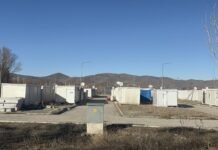
Many of the victims of two devastating earthquakes that hit Turkey in February are still unable to meet their basic needs for water and proper housing seven months after the tragedy, Turkish Minute reported on Wednesday, citing the Mezopotamya news agency.
The magnitude 7.8 and 7.5 earthquakes affected 11 provinces in the country’s south and southeast on Feb. 6, killing more than 50,000 people and leaving millions homeless.
The report was announced by Green Left Party (YSP) deputy group chairperson Meral Danış Beştaş during a press conference held at parliament on the seven-month anniversary of the devastating earthquakes Wednesday.
Beştaş stated that even seven months after the earthquakes, the victims are still living in tents and containers and that they haven’t been able to meet many of their basic needs, especially for water.
She said the earthquakes’ effects have been more destructive for women, adding: “When the limitations of financial resources are combined with the care of children, patients and the elderly, helplessness reaches its peak. Women’s daily lives are seriously strained.”
Beştaş said the situation of the disabled in the earthquake zone, previously estimated at 1 million, has worsened significantly, with an increase in their numbers and heightened accessibility challenges since the earthquakes.
The lawmaker also said the number of missing persons is still being debated even after seven months, with family members struggling to find the remains of their loved ones.
Beştaş also cited a recent report on the Feb. 6 earthquakes by the Turkish Medical Association (TTB), saying that although months had passed since the catastrophe, there was no effort to address the problems, which has led to an emotional collapse.
“There is a need for efforts that dispel the feeling of being forgotten and nurture hope. We all need to be part of this,” she said.
Beştaş further stated that they are calling on both the ruling and opposition parties to urgently convene the parliament with the agenda of remembering the reality of earthquakes, the potential of an earthquake in İstanbul and the forgotten problems in the earthquake region and to immediately establish an earthquake commission.
The Feb. 6 earthquake was a sobering reminder of Turkey’s position as an earthquake-prone country that led to increased migration and changes in daily routines for many citizens.
The North Anatolian Fault crosses the Sea of Marmara, only 15 to 17 kilometers from the southern coast of İstanbul. In 2001, two years after a 7.4-magnitude earthquake left 17,000 people dead in northwest Turkey, experts calculated a 65 percent probability that a quake with a magnitude above 7 would occur before 2030 in the same region — which includes İstanbul.














